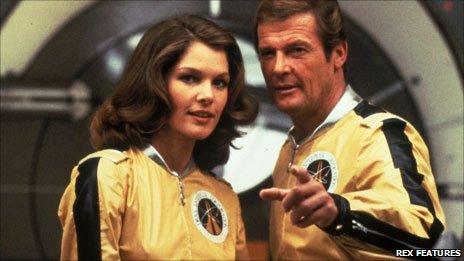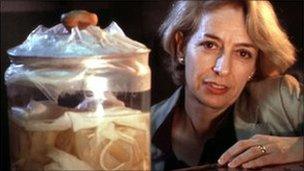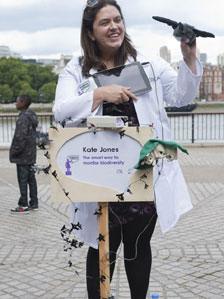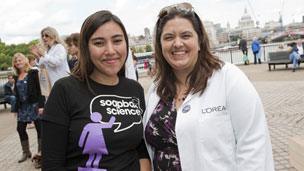The subtle messages that put women off science
- Published

Nasa scientist Dr Holly Goodhead in James Bond film Moonraker was a classic stereotype of a female scientist
Women are being put off working in and studying science by "subtle" messages in the media and society, academics say.
Although girls make up more than half GCSE science students - by the time they reach university science departments they are outnumbered by men by a factor of two to one.
And higher up the academic food chain, for every female science professor, there are nine male ones. So what is putting women off?
"It's not that people actually think there are no women in science it's more subtle than that," says Rachel Tibbell, development consultant at the UK Resource Centre for women in science, engineering and technology (UKRC)
UKRC research suggests women scientists are stereotyped either as frumpy, glasses-wearing cartoon geeks or uber-sexy, Bond-film glamour pusses - who shake their hair out of their specs once they have split the atom.
Gender stereotypes seem to permeate all the way down to children. Mrs Tibbell describes an Open University research project which asked in 2006 a group of children to draw a picture of a scientist. "Overwhelmingly, the children drew a man."
But where does this stereotyping come from? It starts at birth, says Mrs Tibbell.
"I have girl-boy twins and what I found is people buy a car for the boy and a doll for the girl. So already the child is getting a message about the sort of thing they should be doing," she said.
She also highlights the lack of female scientists in the media. Further UKRC research suggests scientific experts interviewed on television are five times more likely to be male than female.
But are these media images, or lack of them, putting off the female scientists of the future?

Professor Susan Greenfield is one of the few female scientists to have made it into the media
Dr Patricia Brekke, a 32-year-old conservation geneticist who has a fellowship at the Institute of Zoology, says: "I wanted to be a female David Attenborough but there was never a female presenter on television.
"But I would never have let this stop me - then I was a little bit obsessed," she said at a recent women in science event at London's South Bank sponsored by L'Oreal and the Zoological Society London (ZSL).
However, some of today's current scientists suggest that even if women do opt for an academic career in science or technology that they can face sexism once they are at university.
'Girls can't do maths'
Dr Kate Jones, a senior research fellow at ZSL, recalls a very macho culture and unrepeatable sexist comments at the university where she studied, although she says it has improved now.
And Professor Charlotte Watts, a mathematics professor and an expert in HIV prevention in the developing world, says: "I remember when I was an undergraduate at Oxford, one of my peers saying; 'I didn't know girls could do maths'."

Dr Jones said she experienced a very macho atmosphere where she studied
She also remembers going to conferences where she was the only woman: "I was a nobody, but everybody knew my name, because I was a woman. I got bought a lot of drinks."
But how much has society moved on the issue? There has been a greater increase in the number of girls studying science technology and engineering subjects at A-level than for boys.
But progress is slow. Sean McWhinnie, independent research consultant with Oxford Research and Policy, said it would be many years before women are represented in equal numbers in the UK's university science departments.
If present rates of increase continue, he predicts men and women will reach parity in 2021 for biosciences, in 2042 for chemistry, in 2060 for physics and in 2109 for civil engineering.
'Short skirts'
And Prof Watts suggests cultural changes are needed. She adds: "I was talking to this older woman and she said that in her day she had not been allowed to study science. Obviously that has changed.
"But she went on to say how much she admired the neuroscientist and former director of the Royal Institution, Professor Susan Greenfield. And then her husband piped up that no one respected her because she wore short skirts."
Dr Brekke suggests that even if women are determined to find their place at an academic institution, problems can arise if they decide to have children.
"The problem is you have to keep up with the latest research and when it comes to getting a grant you are judged by how many papers you have produced."
Dr Jones says when women go on maternity leave they are left with big holes in their academic record for the period of time they take out.
"I am not sure there is any way of showing you have had a break," she adds.
Mother-of-two and 37-year-old evolutionary biologist Seirian Sumner said: "I never really had maternity leave because I had lots of on-going projects and students to see.
"Also because I am a field biologist I had to take my family to Panama for two months. If I had 'logged out', so to speak, I think it would have been even harder coming back."
But eminent plant biologist Professor Ottoline Leyser, author of 'Mothers in Science 64 Ways to Have it All', says there is no reason for women scientists to choose between their career and a family.

Women scientists often feel they must choose between children and careers
"I appeared at a conference in 1993 with my son in my stomach and my daughter on my hip. I was told that my career was in ruins because I had decided to have children."
She argues that working in academia with a family should be easier than other jobs because it can be so much more flexible.
"Even if you are out for a few years for small children it is only a very small proportion of your overall career," she said.
And perhaps most crucially, she adds: "Children have two parents - and men have been happily having careers in science for a very long time."